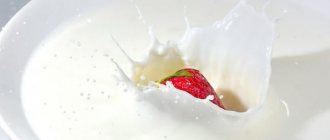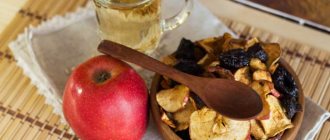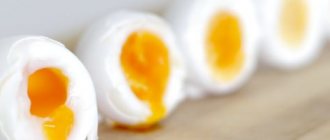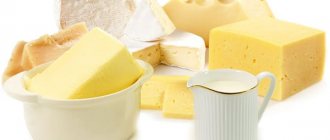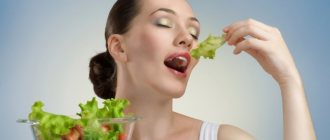Do you want to return to your pre-pregnancy size quickly and without giving up breastfeeding? For you, little tricks from Dr. Komarovsky and Elena Malysheva, as well as an easy way to speed up weight loss!
Author: Kristina Lobanovskaya, doctor, practicing nutritionist Article updated: 02/22/2021
Weight gain during pregnancy is determined by the sex hormones estrogen. They smoothly change a woman’s body, “depositing” fat on the waist, hips, buttocks and back. Soon after a natural birth, about 5 kg of excess weight is lost, and a couple more over the next 2 weeks.
According to statistics, 10% of young mothers return to their usual shape within a month after giving birth. The remaining 90% are forced to use diets.
It is not recommended to launch a weight loss campaign in the first few months after the birth of a child for several reasons: hormonal levels have not yet returned to normal, the functioning of the gastrointestinal tract has not been fully restored, and the child’s body is sensitive to any changes in breast milk. In the future, you can turn to special nutrition systems for nursing mothers, which help in smooth figure correction.
Why is it important to lose weight after childbirth?
The weight gained during pregnancy is bad not only for aesthetic reasons: if you don’t get rid of all the excess weight within six months after giving birth, it will not be a temporary gain, but a long-term problem. New kilograms begin to pile on the weight that is not lost on time. In the future, the situation may result in back pain, endocrine disorders, and varicose veins. Sometimes we are talking about “metabolic syndrome,” which includes diabetes, high triglycerides in the blood, critically low levels of lipoproteins and high blood pressure.
More often than others, the need to lose weight through a special regime is faced by women who became pregnant using IVF, took hormonal maintenance therapy while carrying a child, or suffer from diabetes mellitus with changes in hormonal levels.
How much should a nursing mother drink?
As much as you want. There will always be as much milk in the mother’s body as the baby needs. But if you drink any hot liquid 10–15 minutes before feeding, the level of oxytocin in the body will increase, which will cause a flow of milk. It should be understood that there will be no more milk, it will simply be easier for the baby to suck it out at high tide. By the way, tea with milk does not affect lactation, this is a myth. And if you have a tendency to allergies, you should avoid tea with milk and sugar, as well as condensed milk.
You don’t need to force liquid into yourself, but you don’t need to give it up completely, even if you have a lot of milk that makes your chest burst. Let us repeat again: milk is produced in the body in optimal quantities. But a lack of fluid in a breastfeeding woman can lead to dehydration of her body.
Features of the diet during breastfeeding
A strict diet, which significantly reduces the caloric content of the diet and makes it unbalanced, is prohibited during breastfeeding. Experts offer alternative nutrition systems based on permitted foods. They demonstrate a powerful effect in weight loss without harming the child's health.
The menu of a nursing mother should consist of products that do not cause gas formation or other negative reactions in the child. This rule is the most important, but not the only one:
Meals are small and frequent
Main meals should occur about 5-6 times a day, the amount eaten should be 300-350 g per meal. A few snacks are welcome. In general, the daily amount of food should not exceed 1.5 kg. The main thing is to stop eating four hours before bedtime. Such a diet will speed up metabolism and have a positive effect on lactation.
Sufficient drinking regime
You need to drink a lot (about three liters of still water per day) and often, preferably before each feeding. There is an opinion that a nursing woman should drink tea with condensed milk or cream instead of water. It is a myth.
Adequate protein intake
Experts recommend that breastfeeding women consume at least 100 grams of protein per day. Most of it should be of animal origin.
Avoid overeating
Eating “for two” is a big mistake. The body made the reserves of microelements and nutrients necessary for full lactation during pregnancy, so during the feeding period it is important to focus not on the volume of the diet, but on its quality.
There is no need to finish your baby’s purees and porridge. As practice shows, excessive greed causes even more weight gain. It is also not recommended to try the dishes being prepared.
Taking vitamins
Vitamin complexes help enrich a woman’s body with nutrients. The pharmaceutical industry produces a wide range of vitamin and mineral complexes specially designed for the lactation period. Most Popular:
- Vitrum Prenatal Forte (12 vitamins, 9 micro- and macroelements). The drug is approved from the first day of feeding. Take one capsule per day.
- Elevit Pronatal (12 vitamins, 3 macroelements and 3 microelements). Take one tablet after breakfast.
- Pregnavit (vitamins A, B, PP, C, D3, calcium, iron). Take several times a day.
- Alphabet Mom's health (13 vitamins, 11 macro- and microelements, taurine). Take one tablet three times a day.
- Complements Mama (all necessary nutrients). Take one tablet per day during the first months of feeding.
A young mother can eat in a special way until the desired result is obtained. With natural weight loss, it takes about 8 months. A special diet regimen for a nursing mother speeds up this process.
Authorized Products
They should be present in the diet of a breastfeeding woman no matter what, as they help balance the diet, get the required vitamins and lose weight faster.
Meat
Preference should be given to fat-free varieties: chicken, rabbit, turkey, veal, beef.
Eggs and dairy products
Saturate the body with protein and vitamins. Milk contains calcium, which is necessary for a child’s growing body: it forms the skeletal system, strengthens the immune system, and prevents constipation. A complete lack of calcium is dangerous for a child and a woman.
Vegetables and fruits
They help saturate a woman’s body with fiber, which is important for normal digestion and quick satiety. Along with it comes microelements that are of great importance during this period.
Cereals
Only pea porridge should be avoided, while corn, buckwheat, wheat and rice are very healthy. Dishes based on them should be present in the diet at least several times a week.
Prohibited Products
This list includes everything that can harm the child's health. The following are subject to exclusion from the diet of a nursing mother:
- fatty, smoked and salty dishes;
- fruits from the tropics, including pineapple;
- strong allergens (chocolate, shrimp, strawberries);
- products that cause fermentation (sugar, confectionery, grapes);
- marinades, canned food and pickles;
- onion and garlic;
- spices that negatively affect the taste of breast milk;
- coffee.
Number of calories for weight loss
Each person has his own daily calorie intake, but there is a standard - 2000. For the purpose of losing weight, the figure is reduced to 1200-1600 kcal/day. You cannot go lower, otherwise your metabolism will slow down by 45%.
The calorie content of a woman's diet during the lactation period should not be less than 1500 kcal/day. Ideally – 1800 kcal. About a third should be fat. For example, maintaining a norm of 1500 kcal, you need to get about 40 g of fat. As complementary foods are introduced into the child’s diet, you need to tighten the diet, gradually (!) reducing the fat content to 30 g.
Benefits and harms
Diet pills can really harm a woman’s body and child:
- When breastfeeding, taking medications can cause an allergic reaction in the child.
- The use of drugs based on the principle of filling the intestines can lead to the development of gastritis or stomach ulcers. The substrate remains in the stomach for a long time, which causes the continuous release of gastric juice, which irritates the mucous membrane.
- The visible result obtained with the help of weight loss products quickly disappears after completing the course.
Despite possible side effects, most dietary supplements and diet pills produce positive effects. In a relatively short period of time (from 1-3 months) you can get rid of 5 to 10 extra pounds, without making any additional efforts or food restrictions.
Forced power systems during hot water
Sometimes a nursing woman cannot afford a nutritional system for weight loss that requires compliance with minimum requirements due to health problems in the baby. In these cases, she has to adhere to a special diet. Its scope is important to consider when choosing a weight loss method.
Hypoallergenic
The nutrition system is strict, but effective: in a couple of months you can lose about 10 kg on it. You can prepare dishes only from products approved for consumption. Indications for a hypoallergenic food system are as follows:
- various allergic manifestations in a child (from mild diathesis to atopic dermatitis);
- diseases of the digestive tract in a baby (congenital anomalies, hereditary pathologies, etc.);
- allergic burden of the child’s heredity (in the case of the presence of allergy sufferers in the family).
A woman’s diet should be free not only from the general list of prohibited foods, but also from a number of others:
- eggs;
- honey;
- fish caviar;
- raspberries;
- citrus fruits;
- nuts and seeds;
- cocoa;
- mushrooms;
- semolina porridge.
The following are subject to restrictions: beef, chicken, meat broths, wheat and products made from wheat flour, orange and red vegetables, berries and fruits.
The daily menu might look something like this:
- Breakfast: green tea, cottage cheese casserole without sugar.
- Snack: green tea, a piece of low-fat cheese.
- Lunch: salad with peas, low-fat soup with meatballs and cauliflower.
- Afternoon snack: kefir without sugar.
- Dinner: baked or boiled potatoes, unsweetened kefir.
Dairy-free
Dairy-free is any regimen that includes an approved list of foods and excludes dairy. It is useful for children intolerant to cow's milk. It is temporary, usually up to 4 months of the baby’s life. Afterwards, a nursing mother can introduce dairy products into her diet.
Indicative menu for the day
- Breakfast: oatmeal porridge with dried fruits, cranberry jelly.
- Snack: green tea, boiled egg.
- Lunch: light soup, boiled chicken, mashed potatoes, dried fruit compote.
- Afternoon snack: dried green tea, a couple of walnuts.
- Dinner: buckwheat porridge with steamed meatballs, dried fruit compote.
It is necessary to distinguish between dairy-free and lactose-free diets. The latter is recommended for mothers whose babies suffer from lactase deficiency. Lactase is an enzyme necessary for the digestion of milk sugar. Limiting dairy products in this case will be justified only if you have a food allergy.
Authorized Products
- Bran bread, whole grain toast, biscuits and bran crispbreads.
- Various cereals, it is better to cook porridge without salt, add a minimum of oil to the finished dish. If you like milk porridges, cook them in water with the addition of low-fat milk 1:1.
- Low-fat varieties of meat and fish (beef, veal, rabbit, chicken, pollock, pike perch, bream, blue whiting, cod, hake, perch) can be consumed in the form of steamed cutlets, boiled in pieces or baked.
- Vegetarian clear soups (soups made with recycled low-fat meat broth are allowed). They should be predominantly vegetable (vegetables that are well tolerated by the child). Soups are not fried, little salted and you can add pieces of boiled meat to them, and dried herbs to enhance the taste.
- Boiled or fresh (if the child is well tolerated) vegetables up to 400-500 g daily. Preference is given to carrots, Brussels sprouts, cauliflower, beets (carefully), zucchini, leaf and head lettuce, squash, and pumpkin. They are usually well tolerated by the child. You can make cutlets or stews from them, stew and bake. Baked fish or meat with vegetables (without oil) is a wonderful lunch or dinner for those who want to lose weight.
- Fruits and berries (according to the baby’s tolerance) at least 300-400 g per day.
- The daily diet should include 600-800 ml of fermented milk products (acidophilus, natural yogurt, kefir, yogurt) and cottage cheese or dishes made from it. Milk in an amount of 200 ml and sour cream are allowed only as an additive to the dish. It is better to alternate milk and fermented milk products. If we talk about the fat content of these products, then the optimal is 1.5-2.5%, and for cottage cheese - 2-5%.
- You can eat 25 g of butter per day, 15 g of vegetable oil (corn, sunflower, olive, soy).
- Drinks include tea without aromatic additives (weak black or green), teas with mint, oregano, thyme, occasionally weak coffee, still table water, compotes and fruit drinks.
Table of permitted products
| Proteins, g | Fats, g | Carbohydrates, g | Calories, kcal | |
Vegetables and greens | ||||
| zucchini | 0,6 | 0,3 | 4,6 | 24 |
| Brussels sprouts | 4,8 | 0,0 | 8,0 | 43 |
| cauliflower | 2,5 | 0,3 | 5,4 | 30 |
| potato | 2,0 | 0,4 | 18,1 | 80 |
| carrot | 1,3 | 0,1 | 6,9 | 32 |
| salad pepper | 1,3 | 0,0 | 5,3 | 27 |
| head lettuce | 0,9 | 0,1 | 1,8 | 14 |
| pumpkin | 1,3 | 0,3 | 7,7 | 28 |
Fruits | ||||
| bananas | 1,5 | 0,2 | 21,8 | 95 |
| cherry | 0,8 | 0,5 | 11,3 | 52 |
| pears | 0,4 | 0,3 | 10,9 | 42 |
| plums | 0,8 | 0,3 | 9,6 | 42 |
| apples | 0,4 | 0,4 | 9,8 | 47 |
| baked sweet apples | 0,5 | 0,3 | 24,0 | 89 |
Berries | ||||
| gooseberry | 0,7 | 0,2 | 12,0 | 43 |
Nuts and dried fruits | ||||
| dried fruits | 2,3 | 0,6 | 68,2 | 286 |
Cereals and porridges | ||||
| buckwheat (kernel) | 12,6 | 3,3 | 62,1 | 313 |
| oat groats | 12,3 | 6,1 | 59,5 | 342 |
| cereals | 11,9 | 7,2 | 69,3 | 366 |
| Wheat groats | 11,5 | 1,3 | 62,0 | 316 |
| millet cereal | 11,5 | 3,3 | 69,3 | 348 |
| white rice | 6,7 | 0,7 | 78,9 | 344 |
| barley grits | 10,4 | 1,3 | 66,3 | 324 |
Flour and pasta | ||||
| premium pasta | 10,4 | 1,1 | 69,7 | 337 |
Bakery products | ||||
| vysivkovy bread | 9,0 | 2,2 | 36,0 | 217 |
| bran bread | 7,5 | 1,3 | 45,2 | 227 |
| whole grain bread | 10,1 | 2,3 | 57,1 | 295 |
Confectionery | ||||
| Maria cookies | 8,7 | 8,8 | 70,9 | 400 |
Dairy | ||||
| milk 2.5% | 2,8 | 2,5 | 4,7 | 52 |
| kefir 2.5% | 2,8 | 2,5 | 3,9 | 50 |
| sour cream 15% (low fat) | 2,6 | 15,0 | 3,0 | 158 |
| Ryazhenka 2.5% | 2,9 | 2,5 | 4,2 | 54 |
| acidophilus | 2,8 | 3,2 | 3,8 | 57 |
| natural yogurt 2% | 4,3 | 2,0 | 6,2 | 60 |
Cheeses and cottage cheese | ||||
| cheese | 24,1 | 29,5 | 0,3 | 363 |
| cottage cheese 5% | 17,2 | 5,0 | 1,8 | 121 |
Meat products | ||||
| lean pork | 16,4 | 27,8 | 0,0 | 316 |
| boiled beef | 25,8 | 16,8 | 0,0 | 254 |
| boiled veal | 30,7 | 0,9 | 0,0 | 131 |
| rabbit | 21,0 | 8,0 | 0,0 | 156 |
Bird | ||||
| boiled chicken | 25,2 | 7,4 | 0,0 | 170 |
| turkey | 19,2 | 0,7 | 0,0 | 84 |
Non-alcoholic drinks | ||||
| mineral water | 0,0 | 0,0 | 0,0 | — |
| green tea | 0,0 | 0,0 | 0,0 | — |
| black tea | 20,0 | 5,1 | 6,9 | 152 |
Juices and compotes | ||||
| Apple juice | 0,4 | 0,4 | 9,8 | 42 |
| * data is per 100 g of product | ||||
Gluten-free diet for nursing mothers
Gained popularity all over the world. It is considered a safe way to lose weight. Does not cause harm caused by gluten. The latter refers to protein that, due to individual characteristics, is not absorbed by the body. Many experts call gluten nothing more than a “gateway” to a toxic load: by enveloping the intestines, it reduces the ability to move food, which, when delayed, begins to ferment. Subsequently, increased gas formation is observed.
The advantages of a gluten-free food system are obvious:
- The diet remains balanced and varied, despite exceptions.
- Eating according to the rules helps the body get rid of toxins accumulated over the years.
- Fasting is excluded.
- The result is visible even with minimal effort.
Gluten can be hidden in confectionery, pasta and bakery products, ice cream, convenience foods, store-bought spices, canned meat and fish, sausages, and imitators of natural products. Wheat, oats, barley and rye are completely excluded from the diet.
Recommended for use:
- boiled, stewed or steamed low-fat meat;
- soups with weak meat broth;
- milk and dairy-free porridges made with millet, rice and buckwheat;
- boiled chicken eggs;
- dairy and fermented milk products;
- root vegetables, berries and fruits;
- vegetable and butter;
- bread and pasta substitutes;
- honey;
- berry drinks, fruit jelly, loose leaf tea.
Approximate daily menu
- Breakfast: rice milk porridge, fresh berries, loose leaf tea.
- Snack: dried fruit compote, cornbread.
- Lunch: soup in weak meat broth with rice, buckwheat pancakes, berry juice, baked fish, vegetable salad.
- Afternoon snack: fruit, still mineral water.
- Dinner: buckwheat porridge, stewed vegetables, kefir, a spoonful of honey.
In a week on a gluten-free diet you can lose from 2 to 4 kg.
Protein
In honor of its creator, it is also called the Dukan diet. The essence of the technique is limited consumption of carbohydrates and the predominance of proteins in the diet. The latter are very satiating, so people who adhere to this food system are not overcome by painful attacks of hunger. Breakdowns and overeating are also kept to a minimum. Proteins spend about a third of their calorie content to burn themselves. The diet also has other advantages:
- Eating only natural food.
- Gentle effect on the body.
- No need to count calories.
- No restrictions on portion sizes.
- There is no need to eat food at a strictly designated time.
- Rule out depression.
- Fast and lasting results.
An effective diet requires adherence to the following principles:
- regardless of weather conditions, take walks for half an hour (necessary to improve metabolism);
- drink at least 2 liters of still water per day;
- consume oat bran in the amount of three spoons every day (this helps prevent constipation).
During breastfeeding, Dukan recommends losing weight according to his program, regardless of excess weight. The power system is based on several stages, following one after another:
- Attack (squirrels only).
- Cruise (proteins and vegetables).
- Consolidation (other products are added).
- Stabilization (saving the result in the future).
Pierre Dukan encourages mothers to skip the first two stages, starting with Consolidation (lasts 35 days). The weight loss effect will not be so immediate, but nothing will harm the baby’s health.
Products
There are quite a few products allowed at the “Fixing” stage:
- dairy products with fat content up to 2% (processed cheese, soft cottage cheese, curdled milk, milk, yogurt);
- meat (veal, chicken, turkey, beef, lean ham, fat-free jerky);
- kidneys and liver;
- Fish and seafood;
- eggs;
- pasta (from durum wheat);
- berries and fruits (with the exception of grapes, figs, bananas and cherries);
- bulgur, couscous, peas, rice, lentils, polenta;
- vegetables and herbs (potatoes are consumed in moderation);
- whole grain bread;
- healthy tea.
Fatty and spicy foods are completely excluded. The ban is imposed on canned food, sweets and smoked foods.
Diet features
Pierre Dukan allows mothers who are breastfeeding to deviate slightly from the usual rules of the nutrition system:
- you can eat several servings of fruit (not 200 g, but 400);
- you can have a protein day less often or abandon it completely (Dukan recommends that his patients eat only proteins every Thursday);
- holiday food can be eaten a couple of times a week;
- at the end of the last day of the diet, you can switch to your usual diet, gradually replacing the light menu with the usual one;
- you can start the morning with porridge cooked in water;
- six weeks after the end of the diet, flour and rice can be introduced into the diet.
Menu
For the first seven days, a nursing mother is advised to consume cheeses, yogurt and eggs. The products are included in salads and various dishes, and consumed separately. The number of fruits is limited to three apples. If you feel great after a week, the woman can continue to eat in the same way, adding pasta and cereals.
The third week of a nursing mother’s diet involves the introduction of foods into the diet that work to increase its diversity: fish, chicken, beef. At the same time, cheeses and yogurt are slightly limited. The fourth and fifth weeks follow the same plan.
A possible daily menu looks like this:
- Breakfast: ham, omelette, bread, tea.
- Snack: fruit.
- Lunch: fish soup, lean baked meat, salad.
- Afternoon snack: cottage cheese casserole with berries, tea.
- Dinner: stew, turkey fillet, pasta.
A nursing mother can eat according to the Dukan system without restrictions on duration, that is, until the desired weight is reached.
Fashionable diets after childbirth
The media often talk about weight loss methods used by celebrities. Naturally, they arouse interest among ordinary women, including nursing mothers. The question arises: are “star” nutrition systems capable of causing harm during lactation?
Rational
The diet is based on oatmeal porridge with water, poultry, fish, vegetables and fruits. Drinks allowed are tea without sugar, grapefruit and carrot juices. Hot and spicy foods are strictly prohibited, as is eating after 6 pm. It is not recommended to consume carbohydrates and proteins at the same time, but vegetables can be eaten with anything. Apples are allowed between main meals.
The daily menu might look like this:
- In the morning - boiled egg, low-fat yogurt, bacon.
- In the afternoon – stewed vegetables, baked chicken.
- In the evening - vegetable salad, jacket potatoes.
According to experts, the diet can be used without fear during breastfeeding. Thanks to separate power elements, the deposition of toxins is reduced. The diet itself is balanced, as it contains proteins, fats and carbohydrates in a harmonious ratio. Juices saturate the body of a nursing mother with vitamins and microelements; malic acid helps normalize metabolic processes.
Grapefruit
This involves eating half a grapefruit before each meal. In this case, you can leave the usual menu, but the energy value of food eaten at a time should not exceed 800 kcal (this is how much a fruit can burn).
Experts say that grapefruit is a really good ally in the fight against excess weight. It ensures rapid passage of food through the intestines, which results in less absorption of food elements into its walls. However, when breastfeeding, the “trick” is not suitable, since the fruit is classified as a strong allergen. A woman can resort to such a diet only after finishing breastfeeding.
Vegetarian
The nutritional system allows you to eat whole grains, fruits, and vegetables. An important condition is sufficient drinking regime. The ban is imposed on meat and dairy, and alcohol. The diet is quick, as you can follow it for about two weeks. The daily menu could be like this:
- In the morning – juice from apples, celery and carrots, sunflower seeds and pumpkin.
- Lunch – raw vegetables and fruits, warm water with a few drops of lemon juice.
- Evening – salad with seeds and nuts.
You are allowed to snack on raw carrots.
Experts consider this method of losing weight to be a raw food diet, since the products are used only in their unprocessed, raw form. Despite the tangible effect (in 15 days you can actually lose a sufficient amount of extra pounds) and a balanced diet, the nutritional system has a number of contraindications. A nursing mother can use the diet menu as a fasting day, but consume vegetables boiled or steamed. Nuts and seeds are high in calories, so the energy value of the daily diet will be at least 1200 kcal.
Normal weight after pregnancy
When deciding how to lose weight after childbirth for nursing mothers, it is imperative to take into account the woman’s weight before pregnancy, as well as the number of kilograms gained. On average, during a normal, singleton pregnancy, a woman gains 10 kg.
Girls with low body weight during pregnancy gain from 15 to 20 kg, with initial excess weight - 7-9 kg. As a rule, immediately after childbirth, the mother loses 5-7 kg. The body spends a large amount of energy on milk production, so another 5-7 kg are lost during the period of breastfeeding.
If you gain a little weight during pregnancy, a woman does not have to worry about losing weight - the extra pounds will disappear on their own due to lactation. If your body weight has increased significantly, simple, effective ways to quickly lose weight after childbirth while breastfeeding will help.
What does Komarovsky think?
The advice of the people's doctor delights many mothers. Thanks to his practical and at the same time simple tricks, you can lose weight without harming your own body or the health of your baby. Evgeniy Olegovich developed a nutrition plan for breastfeeding women. According to him, he must be free from:
- preservatives;
- dyes;
- allergenic and fatty foods;
- chocolate and sugar;
- fast food.
Komarovsky does not impose strict prohibitions on the diet of a nursing mother, but recommends giving preference to:
- cereals;
- lean meat;
- fruits (non-allergenic);
- vegetables;
- dairy products;
- fats of vegetable origin.
As for drinks, the doctor allows:
- green tea;
- dried fruits compote;
- fermented milk and milk drinks with a fat content of no more than 2.5%.
Keep a food diary
Record everything you eat and drink during the day, as well as your baby's reaction 1-2 hours later. In this way, you can identify products that hinder the baby’s gastrointestinal tract or cause colic, and understand what causes an allergic rash or other manifestations in the child.
Pay special attention to the consequences after eating citrus fruits, strawberries, nuts, eggs, milk, chocolate and other allergenic foods. If you experience any unwanted symptoms, eliminate these foods from your diet for a while. However, sometimes it is worth re-checking the child’s reaction to their use.
To make it easier to track reactions to foods and dishes, eat them separately. Because if there were a lot of things in one meal at once, it will be difficult to determine what exactly the baby reacted to.
Advice from Elena Malysheva
Malysheva’s diets have gained credibility among those seeking weight loss. A nutritional system has not yet been developed for nursing mothers, but Elena offers practical advice for normalizing digestion and smoothly getting rid of extra pounds. Some of them can be used during lactation.
Not to starve
Suspecting that it is in danger of starvation, the body begins to make reserves even from meager food intake. You need to eat often, in small portions.
Count calories
The main ally of those losing weight is accurate “accounting”. At the same time, the menu should be varied.
Chew food thoroughly
Processing food with saliva and grinding it with teeth helps to enjoy the taste of food, avoid overeating and ease the work of the stomach in the future. Prepared food passes through the digestive tract more easily and is absorbed much faster.
Make water your ally
Water perfectly fills the stomach and fights hunger, having zero calories, it helps improve metabolism, removes toxins and normalizes intestinal function. Malysheva strongly recommends drinking at least 10 glasses of still water per day. It is especially important to drink 1 glass in the morning, on an empty stomach.
Do physical education
Moderate physical activity does not overload the cardiovascular system, increases alertness and helps in the fight against excess weight. Nursing mothers cannot do without them. The main thing is to choose the appropriate option.
How do the pills work?
The active ingredients of diet pills dull the feeling of hunger due to:
- Inhibition of the brain centers responsible for hunger. The active substance produces excessive release of hormones such as norepinephrine and serotonin. When hormones interact with the receptors of the satiety center, a person experiences a feeling of satiety that does not go away for a long time. The use of drugs based on this method can lead to the body stopping releasing the required amount of hormones without external stimulation. As a result, after completing the course, the young mother may experience a feeling of hunger, even after her stomach is full;
- Filling the stomach. When the substances contained in the tablet enter the stomach, they begin to produce a water-based gel. Therefore, such tablets must be taken with plenty of water. This hydrogel fills the stomach by about a third. As a result, satiety comes from less food. Such substances are safe and do not lead to negative side effects;
- Filling the intestines. After entering the small intestine, the active substance swells, which blocks the passage of food from the stomach to the intestines. Due to this, a feeling of satiety appears. Taking drugs of this type can lead to complications in the gastrointestinal tract and cause gastritis.
How to make your diet more effective
An effective way to regain your previous shape after childbirth is moderate physical activity. When combined with a nutritional system for weight loss, they demonstrate excellent results, having a beneficial effect on metabolism and mood. At the same time, any exercise interferes with the successful healing of the uterus, so it is recommended to start exercising only six weeks after the birth of the child. Early activity can harm lactation!
Do not underestimate the “physical education” that comes into a woman’s life with the birth of a baby. Caring for a newborn is already exercise that can burn calories.
Mind-Body practices such as meditation, yoga and Pilates are also permitted. With their help you can transform your body at any stage of life. They have no contraindications, minimize stress, and can be easily performed at home.
The choice of load six weeks after birth must be approached rationally. The best type of physical activity during pregnancy and lactation is a swimming pool. If a nursing mother decides to go to the gym, it is important to remember to exercise without weights. Aerobic exercise is best avoided, as it promotes loss of large amounts of fluid and poses a danger to the breasts.
Walk with your child as much as possible
Do you remember the WHO recommended norm of 10,000 steps per day? So, with your baby you will easily follow it every day and, most likely, you will begin to go through much more. All you need to do is go for a walk in the fresh air 2-3 times a day.
Walk for at least an hour. Just don’t sit on the bench, but carry the stroller with the child. Explore new places in your area. When the child grows up a little, it will be very interesting for him to watch the constantly changing picture from his stroller. Show your baby everything you see on your walk: growing flowers and trees, animals and birds, a playground, buildings, natural phenomena, other children.
Just imagine, because he sees all this for the first time. His eyes will watch everything with delight, and his hands will want to try everything by touch. Introduce your baby to this world, and he will teach you to enjoy simple things, notice the beauty in what is nearby, and appreciate every day you live.
You might have forgotten these feelings when you grew up, but now it’s time to once again admire the raindrops hitting a puddle, the birds singing outside, the rustling of leaves, the blossoming trees.
Reviews and results of losing weight
Oksana, 32 years old
During pregnancy I gained 20 kg. A lot, I know. The gynecologist constantly discouraged me from eating buns, but my body insistently demanded junk food. After giving birth, I lost 7 kg. During the first month, breastfeeding became lighter by another 2 kg. Of course, she was unhappy. I decided to call a diet for help. I settled on gluten-free. I heard that it is really effective. I immediately had to give up not only my favorite buns, but also sausages. In 2 months I managed to lose 5.5 kg. Since I am already accustomed to a gluten-free diet, I will continue.
Olga, 24 years old
After the birth of my son, I realized that I was completely unhappy with my reflection in the mirror. Before giving birth, I weighed 56 kg, after - 64. Friends and my mother tried to prove that breastfeeding would soon help me get in shape. But can you convince me? I started looking for a suitable way to lose weight. I chose a rational diet for myself, allowing me to eat porridge, poultry, fish and fruits and vegetables. In principle, this diet suited me. After being unloaded for a month, I became only 2 kg lighter. It's a shame, but I continue to strive for the goal.
When can you start losing weight?
Losing weight after childbirth while breastfeeding should begin only after the female body has fully recovered after childbirth. The birth of a child is a great stress for all internal organs, the recovery of which requires at least 7-8 weeks.
It is for this reason that nutritionists recommend that women begin to return to their former forms only 2 months after childbirth. Until this moment, it is best to take care of high-quality lactation, because it also requires significant energy expenditure, contributing to weight loss.
